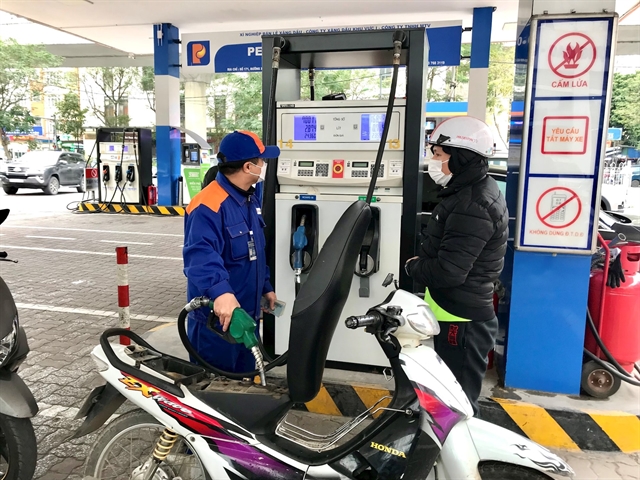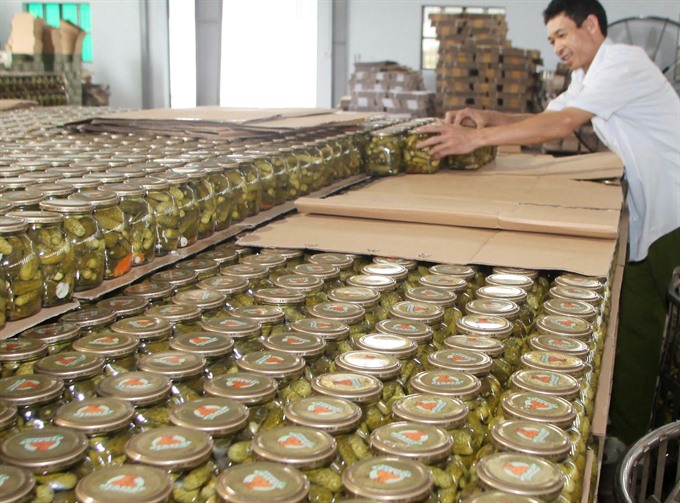 Economy
Economy

As stated in the Ministry of Planning and Investment (MPI)’s latest suggestion to the Government, a staggering amount of 1,930 business conditions and permits would be in line for removal, following an earlier demand from the Prime Minister to clear unnecessary business regulations.
 |
| Pickles production at the VIFOCO plant in Bắc Giang City. — VNA/VNS Photo Trần Việt |
HÀ NỘI — A whopping 1930 conditions on licensing, registration and operations of businesses could be removed under the latest proposal made by the Ministry of Planning and Investment (MPI).
Following up on earlier instructions from the PM to weed out unnecessary regulations and hindrances to business development, the MPI is recommending partial or complete elimination of 302 financial conditions, 1,336 productivity conditions, 127 conditions on business methods, 85 on location and 80 urban planning requirements.
Ministry representatives said at a Government meeting attended by the Prime Minister Nguyen Xuan Phuc on Tuesday that other existing business requirements relating to human resource management, save for those that need high quality workers with experience and skills, like in healthcare or auditing, would also be up for the chop as the MPI sees them as redundant and complicated.
They said that the elimination of superfluous conditions is not only aimed at forging an action-oriented Government, but also based on general regulations of the Organisation for Economic Co-operation and Development (OECD).
The approach is that business regulations have to be based on actual needs of the economy and accommodate companies’ growth, not stunt it, the officials said.
According to the MPI, there are eight broad groups of business conditions and permits currently in force, covering legal frameworks for operation, a certified workforce, productivity, arrangement of manufacturing area, basic financial capability and so on.
At present, these eight permit groups are regulated by a multitude of legal documents that often overlap in more than a few areas of management. These, in turn, get implementation guidelines and instructions in the form of decrees, circulars and decisions.
It is estimated that there are 4,284 business and investment requirements across 243 business sectors under the control of 15 ministries and agencies, regulated by 237 legal documents consisting of 66 laws, three ordinances, 162 decrees and three agreements.
MPI officials said that thanks to concerted efforts by all ministries, current regulations have become more transparent and coherent, but there were still limits to their effectiveness in helping firms expand production and become more competitive.
Therefore, in addition to removing unwanted business requirements, the whole legal framework on management must be renovated in accordance with the OECD rules, they added.
Self-regulation
Several changes can be made, such as allowing firms to perform quality inspections on their own products based on pre-existing guidelines, with authorities conducting random checks to save time and cost. New managerial styles can be adapted to against both systematic and individual business risks, they said.
The Vietnam Chamber of Commerce and Industry (VCCI) said that firms across the Industry and Trade, Transportation, Technology and Science sectors are strongly in favour of further simplification of business permits.
Independently, the VCCI suggested removing 56 and changing four business conditions under the Ministry of Industry and Trade (MoIT), removing 27 and changing four under the Ministry of Transportation (MoT), and removing 13 and changing five under the Ministry of Science and Technology (MST).
Negative impacts
Research done by the Central Institute for Economic Management (CIEM) found that there are at least six negative impacts that stem from the proliferation of business conditions.
First, they create an unreasonable barrier for investors and firms looking to enter the Vietnamese market, and keep the number of newly registered businesses down. Eventually, they drive away potential investors who cannot meet the initial requirements of infrastructure, machinery and human resources.
Second, market competitiveness is restricted because there are less firms in the field, and large firms are able to exert monopolistic control of the market.
Third, business creativity is suppressed under the strict requirements of business permits, as they regulate the exact kind of business that should be run, the technology it should use and the production method it should follow.
Fourth, excessive regulations reduce productivity, increase costs and decrease added value, which lower firms’ revenue and their ability to reinvest in the economy.
Fifth, some regulations create huge operational risks for businesses as they are oriented for short terms, not allowing firms to plan ahead. This causes firms to hesitate before committing large investments, fearing changes in government regulations.
Sixth, the ambiguity of some conditions precludes detailed regulations that can be applied universally across sectors, creating a general confusion for both firms and administrative officials in applying for and granting permits.
Reports and suggestions from the MPI, VCCI and CIEM were presented to the Government Office and the PM at the meeting.
The Prime Minister asked responsible ministries and research institutions to work together and finalise the list of removable business conditions soon, collecting opinions from firms and investors.
He said that he hopes to see tangible results in the fourth quarter of 2017, with the MPI coming up with clear guidelines on business conditions that would help alleviate administrative burdens for both government officials and businesses. — VNS

.jpg)


